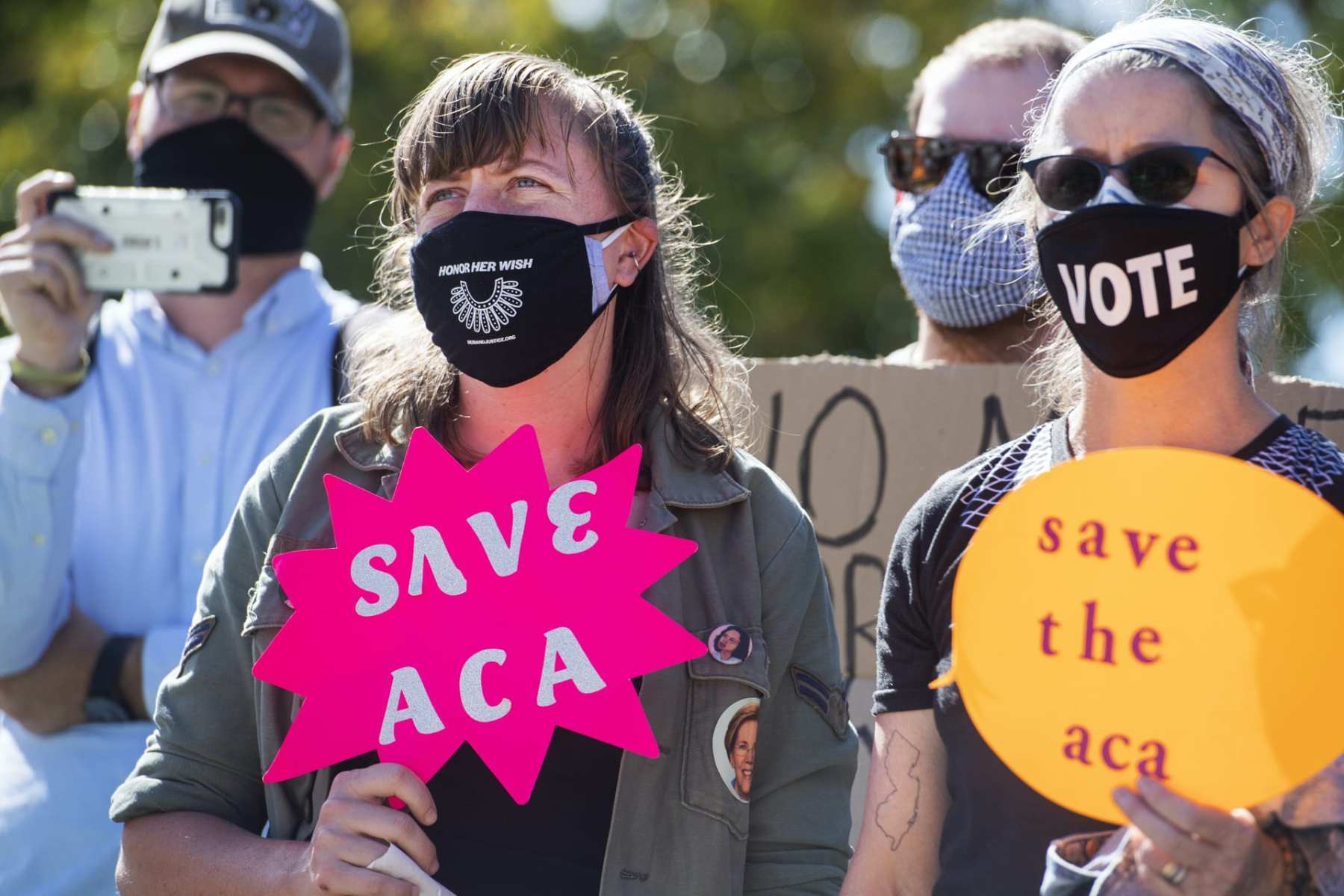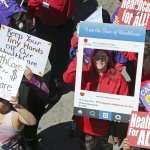Health care protections — specifically, affordable insurance for people with preexisting medical conditions and maintaining abortion access — are top of mind for women voters, new polling suggests. And those questions emerged again at Thursday night’s presidential town halls.
Both health care concerns reentered the national spotlight following this week’s confirmation hearings for Amy Coney Barrett, Trump’s nominee to fill the Supreme Court’s ninth seat.
If confirmed, Barrett could weigh in on a pending court case that seeks to overturn the Affordable Care Act, including its prohibition on health insurance charging people more based on their medical histories. In previous lawsuits, Barrett has indicated skepticism about upholding the health law, a history that Senate Democrats emphasized during this week’s questioning. (The Trump administration is arguing in favor of eliminating the law.) She has also signed onto an advertisement suggesting that Roe v. Wade, which guaranteed the right to an abortion, should be overturned.
Neither of those stances is popular, per new polling from the Kaiser Family Foundation, a nonprofit health policy research group. The poll, released Friday morning, finds that almost four-fifths of Americans — 79 percent — oppose overturning the ACA’s insurance protections for people with preexisting health conditions.
About 69 percent want to maintain the abortion protections guaranteed by Roe v. Wade, the landmark Supreme Court case.
The KFF poll doesn’t show a gender gap when it comes to someone’s likelihood of voting based on health care issues, specifically, said Ashley Kirzinger, KFF’s associate director for public opinion and survey research. But the fact that health care remains a top issue is particularly salient, she said, especially as both Trump and Biden are working to shore up suburban women voters.
“We should expect to hear the candidates talk a lot about health care in the last couple of weeks,” Kirzinger said.
Women carry greater health care burdens, are more likely to have pre-existing conditions and disproportionately benefit from the ACA. They more often cite health care as a major issue in determining how they will vote.
Specifically, the KFF poll found that both Democratic and independent women tended to place preexisting condition protections as their top health concern. They are also more likely to trust Biden on handling the issue, and skeptical that Trump has any plan to maintain those protections.
“Women give Biden the advantage across all health care issues, including more than a two to one advantage on reproductive health, and so I think, right now, Biden has the clear advantage among female voters,” Kirzinger said.
Both candidates fielded questions about how to handle the coronavirus pandemic. But Biden faced little questioning about the ACA on Thursday night.
When fielding questions about the Supreme Court confirmation process, though, he spoke about the implications of the health law being struck down, highlighting in particular the “100 million with preexisting conditions.”
At Trump’s town hall, where the majority of questions came from women, undecided voter Christy Montesinos Alonso asked about the president’s health care plan, citing in particular his previous platform to “repeal and replace Obamacare.” Alonso and her husband are both self-employed, she said, and purchase individual coverage.
Trump has repeatedly promised to unveil a superior health care plan that would cost less, but did not put a plan forth at his town hall. He also said his administration is “always protecting people with preexisting conditions” — a claim that runs counter to his efforts to undo the ACA and to loosen regulations around what private health plans must cover.
No speakers at Biden’s town hall — whose questioners were predominantly men — asked about reproductive health. Biden has made mention of the issue on the campaign trail, particularly in light of the pending Supreme Court confirmation and its implications on abortion access. But he has spent little time talking about his reproductive health agenda.
Women overall trust Biden more on issues of reproductive health and abortion, Kirzinger said. But Republican women, who are less likely to vote on health care, specifically, more often trust Trump on that particular issue, per the KFF poll. That difference, Kirzinger said, is likely a reflection of his opposition to abortion, a stance many Republican women share.
Still, Trump declined to specifically take a stance on Roe v. Wade, even when asked by Moriah Greene, a “pro-life millennial” about what protections would be kept in place “where the mother’s life is in jeopardy” if Roe v. Wade is overturned. Trump’s reelection campaign has gotten financial support from the Susan B. Anthony List, a major anti-abortion advocacy group.
If the abortion protection is reversed, Trump, who has previously acknowledged that Barrett’s confirmation could result in Roe v. Wade’s reversal, said, “perhaps it could get sent down to the states, and the states would decide.”
“I think that she’s going to make a great decision. I did not tell her what decision to make. And I think it would be inappropriate to say right now because I don’t want to say anything to influence her,” he said.





